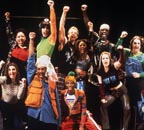
Last week, the Broadway musical Rent closed, marking an end to a successful
12-year run. The show, inspired in part by the Puccini opera La Boheme, was
about AIDS and poverty among the residents in Manhattan’s East Village. The
music however was not operatic; Rent featured a five-piece band on stage playing
rock. It was a musical developed by a then-unknown composer in his early
thirties, Jonathon Larson, whose unexpected passing on the night after the final
dress rehearsal, only added more to the lore of an unusual production that was
supposed to change Broadway.
While the play did not change Broadway, it did open to critical acclaim and won
a slew of awards including a Pulitzer Prize, Best Musical (New York Drama
Critics Circle), and four Tonys. Time magazine called it “the most exuberant and
original musical to come along this decade” and Ben Brantley in the New York
Times declared that the play “shimmers with hope for the future of the American
musical.” Over the 12 year run, attendance waxed and waned, but more than a full
decade after its opening, according to some, including Maclean’s magazine senior
editor Steve Maich, “everything that seemed so bold and provocative and new 12
years ago now seems utterly conventional and familiar, or worse – clangingly
dated.” Maich cites, among other things, the dated technology (beepers and
answering machines), clothing and setting – the gritty East Village no longer
exists, having been replaced by “million dollar lofts, fine restaurants, and
purveyors of organic coffee at $4.50 a cup.”
A 12 year run for a play might seem like a very long time and a boon to those
involved, but historically 12 years is a drop in a pond. What is it about a play
that can have it become outdated in such a short time? In plays, like many works
of art and literature, there are components which belong to history and
components which go beyond history. Many plays remain relevant and popular years
after their openings and closings. Those components which go beyond historical
circumstance usually deal with the depth of the human reality – experiences,
questions and struggles which deal with the human need to know ourselves and our
world and to experience these in more full and meaningful ways. Such works touch
the psyche and are not easily forgotten.